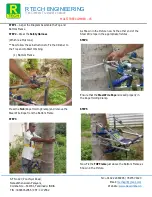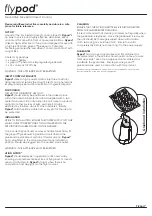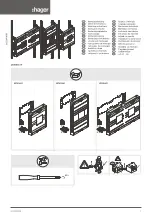
Section BXM‐301‐10H‐20A
030‐101901 Rev. A
R
14
1608IARA
Figure 19. Clean the Air Intake/Exhaust Holes
remove any debris
from the vent holes
Periodically
Top and bottom mounting
brackets not shown
ÖÖ
ÖÖ
ÖÖ
3.17
Performing Cabinet Housekeeping
Verify all equipment is secure, verify all wires and cables are
neatly organized and managed, verify all bonding and ground
ing connections are made at the ground plate, and verify no
equipment, tie‐downs, cables, or wires will interfere with the
closing of the door. Clean up the installation site per company
practice.
3.18
Closing and Locking the Cabinet
Upon completion, the installer should close and lock the cabi
net by tightening the door's cup‐washer screw. The customer
may optionally lock the door with a padlock (customer sup
plied) through the holes provided for it at the bottom of the
door‐lock flanges.
4.
MAINTENANCE
The Westell
r
Boxer
t
components are maintenance‐free,
however, please note the following item.
S
At least once every six months, inspect the Boxer‐30 cabi
net to remove any debris from the fan cover's screened
holes (Figure 19). This facilitates proper operation of the
cabinet and allows unobstructed air flow.
5.
SERVICE AND REPAIRS
Replacing parts is the only recommended type of field repair
for the Westell
r
Boxer
t
cabinet. The list below contains the
only Boxer parts which may be ordered and field‐replaced (see
Part 6 for a telephone number, Table 2 for part numbers, and
Paragraph 7.2 for the return procedure).
Field‐replaceable parts:
S
Heat exchanger
‐ CAUTION ‐
To avoid electrical shock, turn off any power feeds to the
equipment being replaced or serviced, before removing or
replacing the equipment.
5.1
Replacing the Heat Exchanger
The Heat Exchanger cannot be field
repaired
. Should a prob
lem be suspected with the heat exchanger, it must be replaced.
Follow the steps below and see Figure 20 to replace the heat ex
changer. Refer to Table 2 for the replacement heat exchanger
part number.
ÖÖ
ÖÖ
ÖÖ
ÖÖ
ÖÖ
Figure 20. Field Replacement of Heat Exchanger
Location of
top two nuts
Location of
four lower bolts
Heat exchanger
Hole for AC
power cord
(1/4‐20)
(1/4‐20)
Top and bottom mounting
brackets not shown
Ö
Ö
Ö
‐ CAUTION ‐
Westell recommends that two people be used to replace the
heat exchanger, one to hold the exchanger box on the outside
of the door, and one to remove/attach hardware on the inside
of the door.
1.
Open door, unplug power cord.
Open the Boxer‐30 door,
and unplug the heat exchanger's power cord from the AC
outlet box inside the Boxer‐30.
2.
Detach and set aside the four bottom bolts.
On the inside
of the door are 4 bolts that secure the bottom part of the
heat exchanger box to the door. Remove the four bottom
bolts, see Figure 20 for the location of the bolts.
3.
Detach and set aside the two top nuts
. On the inside of the
door are 2 nuts that secure the top part of the heat ex
changer to the door. While another person on the exterior
side of the door holds the exchanger box, remove the two
top nuts. Keep the nuts for the new unit.
4.
Lift exchanger box off the door.
From the exterior side of
the door, lift and pull off the heat exchanger box from the
door, allowing the two top bolts to exit out the top holes
and feeding the power cord out the hole provided for it at
the top right inside corner of the door. Set aside the unit
being replaced.
5.
Open and inspect the replacement unit.
Open the shipping
box for the new heat exchanger, examine the unit for any
shipping damages. If no damage is present, the new unit
may be mounted.
6.
Lift new unit and feed power cord through the hole.
With
one person on each side of the opened door, lift the heat
exchanger. Feed the AC power cord through the hole
provided for it at the top right
inside
corner of the door.
7.
Hang unit from top two holes.
Align the two protruding
bolts on the back side of the exchanger with the two top
holes on the door which were vacated by removing the old
exchanger. Verify the AC cord is hanging freely on the in
side of the door. Insert the two top bolts through the top




































